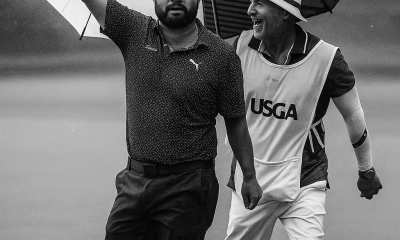Opinion & Analysis
Golf Gratitude: The story of Danny List

If ever there was a perfect story for my Golf Gratitude series, it is the journey of Danny List, a golfer from Ghana, who is making waves as he embarks on his PGA TOUR debut at the Genesis Invitational today. This significant moment is not just a personal victory for List but also an important moment in promoting diversity in golf, a sport often criticized for its lack of representation. The backdrop to List’s dream debut is the beauty of Torrey Pines, where the world’s top golfers are gathering this week, and under the host organization of the Genesis Invitational, the Tiger Woods Foundation, List’s story stands out uniquely.
Danny List is competing this week on a sponsor’s exemption. Not just any sponsor’s exemption but the prestigious Charles Sifford Memorial Exemption, named after the trailblazing African-American golfer who paved the way for racial equality in the sport. This annual exemption is intended to honor Sifford’s legacy and continue his mission to promote diversity in golf. It underscores an important initiative by the Tiger Woods Foundation, championing inclusivity and creating opportunities for golfers from varied backgrounds.
For List, the journey to Torrey Pines was not just a straight drive but a winding fairway with many challenges. Raised in Accra, Ghana, List grew up in humble beginnings where golf equipment and facilities were not easily accessible. “Growing up, I made my first club with a stick,” List recalls. His dedication to the sport becomes even more inspiring, knowing that opportunities were limited and aspirations often far-reaching.
The Genesis Invitational marks the beginning of a new chapter for List, but his dedication and passion for the sport have been steadfast. “It’s all gravy,” he shared in a recent interview, expressing his gratitude for the chance to showcase his talent on such a prestigious stage. List’s approach to the game is refreshing—humble and fiercely determined.
“I’m here for every moment,” List said enthusiastically ahead of his debut. His presence at the course is not merely symbolic but also a testament to hard work and resilience. List’s participation this week is a powerful reminder of the importance of bridging ability with opportunity.
The sponsor’s exemption is also emblematic of the larger shift in the world of golf, where organizations increasingly acknowledge and act on their responsibility to foster environments of inclusivity. The Tiger Woods Foundation’s choice to honor Sifford’s legacy through actions rather than just words has opened doors for List and others like him who aspire to reach the pinnacle of their sport.
Fans, both at Torrey Pines and watching worldwide, will no doubt be watching closely as Danny List takes his very polished and impressive game to the PGA TOUR. No matter what he shoots this week, it’s certain that with each drive, approach, and putt, a deeper story of dreams pursued under the most unlikely of circumstances will unfold.
At just 26 years old, Danny has already carved an incredible journey in the world of golf. Growing up in Accra, Ghana, he honed his skills on greens that, as he modestly puts it, were “probably a 2 on the Stimpmeter.” At 13, he received a scholarship to a boarding school in England, where his talent really began to take shape. There, he made a name for himself as a rising junior player, eventually earning a spot to play golf at the University of Washington. After just one year with the Huskies, Danny felt the calling to pursue his professional dreams.

Courtesy of @thegenesisinv on Instagram
Danny’s professional journey faced a significant hurdle in 2023 when he suffered a stress fracture in his lower back, sidelining him for an entire year. He didn’t pick up a club during that time, as recovery was the primary focus. This could have been a breaking point for just about anyone, but not for Danny. Fueled by determination and an undying passion for the game, he made a remarkable comeback in 2024, shattering records with his 21-under-par victory at the California State Open. His perseverance and subsequent payoffs didn’t stop there. Last November, Danny earned his DP World Tour card for 2025 by finishing among the top 21 players at the DP World Tour Q-School finals. One of the biggest intangibles for any aspiring golfer that makes it to the professional ranks is a can’t stop, won’t stop attitude. Danny’s journey is a testament to the power of resilience and the relentless pursuit of one’s dreams.
This story brims with promise as Danny List not only plays to win but also plays to inspire. For him and many aspiring golfers from diverse backgrounds, the Genesis Invitational is more than just a tournament—it’s an arena for dreams once deferred to finally be seen and celebrated on an international stage.
Danny List is not just a golfer today as he tees it up at Torrey Pines but a torchbearer for change, illuminating a path once paved by the likes of Charlie Sifford and now driven forward by passionate players determined to change the game’s landscape.
Golf Gratitude: Your weekly dose of good vibes from the golf world is my new weekly look at the feel-good stories happening in golf. Why? Because we all need a little dose of good vibes occasionally.
Reader, please support me by checking out my three weekly columns on RG.org. On Mondays, I present “The Starter,” which recaps the week gone by in golf. On Thursdays, I give you “Fairway Focus,” which previews the week to come in golf. And on Saturdays, I dish up the “Weekend Fore-cast,” a look at what’s on tap for the upcoming weekend.
Opinion & Analysis
The 2 primary challenges golf equipment companies face

As the editor-in-chief of this website and an observer of the GolfWRX forums and other online golf equipment discourse for over a decade, I’m pretty well attuned to the grunts and grumbles of a significant portion of the golf equipment purchasing spectrum. And before you accuse me of lording above all in some digital ivory tower, I’d like to offer that I worked at golf courses (public and private) for years prior to picking up my pen, so I’m well-versed in the non-degenerate golf equipment consumers out there. I touched (green)grass (retail)!
Complaints about the ills of and related to the OEMs usually follow some version of: Product cycles are too short for real innovation, tour equipment isn’t the same as retail (which is largely not true, by the way), too much is invested in marketing and not enough in R&D, top staffer X hasn’t even put the new driver in play, so it’s obviously not superior to the previous generation, prices are too high, and on and on.
Without digging into the merits of any of these claims, which I believe are mostly red herrings, I’d like to bring into view of our rangefinder what I believe to be the two primary difficulties golf equipment companies face.
One: As Terry Koehler, back when he was the CEO of Ben Hogan, told me at the time of the Ft Worth irons launch, if you can’t regularly hit the golf ball in a coin-sized area in the middle of the face, there’s not a ton that iron technology can do for you. Now, this is less true now with respect to irons than when he said it, and is less and less true by degrees as the clubs get larger (utilities, fairways, hybrids, drivers), but there remains a great deal of golf equipment truth in that statement. Think about it — which is to say, in TL;DR fashion, get lessons from a qualified instructor who will teach you about the fundamentals of repeatable impact and how the golf swing works, not just offer band-aid fixes. If you can’t repeatably deliver the golf club to the golf ball in something resembling the manner it was designed for, how can you expect to be getting the most out of the club — put another way, the maximum value from your investment?
Similarly, game improvement equipment can only improve your game if you game it. In other words, get fit for the clubs you ought to be playing rather than filling the bag with the ones you wish you could hit or used to be able to hit. Of course, don’t do this if you don’t care about performance and just want to hit a forged blade while playing off an 18 handicap. That’s absolutely fine. There were plenty of members in clubs back in the day playing Hogan Apex or Mizuno MP-32 irons who had no business doing so from a ballstriking standpoint, but they enjoyed their look, feel, and complementary qualities to their Gatsby hats and cashmere sweaters. Do what brings you a measure of joy in this maddening game.
Now, the second issue. This is not a plea for non-conforming equipment; rather, it is a statement of fact. USGA/R&A limits on every facet of golf equipment are detrimental to golf equipment manufacturers. Sure, you know this, but do you think about it as it applies to almost every element of equipment? A 500cc driver would be inherently more forgiving than a 460cc, as one with a COR measurement in excess of 0.83. 50-inch shafts. Box grooves. And on and on.
Would fewer regulations be objectively bad for the game? Would this erode its soul? Fortunately, that’s beside the point of this exercise, which is merely to point out the facts. The fact, in this case, is that equipment restrictions and regulations are the slaughterbench of an abundance of innovation in the golf equipment space. Is this for the best? Well, now I’ve asked the question twice and might as well give a partial response, I guess my answer to that would be, “It depends on what type of golf you’re playing and who you’re playing it with.”
For my part, I don’t mind embarrassing myself with vintage blades and persimmons chasing after the quasi-spiritual elevation of a well-struck shot, but that’s just me. Plenty of folks don’t give a damn if their grooves are conforming. Plenty of folks think the folks in Liberty Corner ought to add a prison to the museum for such offences. And those are just a few of the considerations for the amateur game — which doesn’t get inside the gallery ropes of the pro game…
Different strokes in the game of golf, in my humble opinion.
Anyway, I believe equipment company engineers are genuinely trying to build better equipment year over year. The marketing departments are trying to find ways to make this equipment appeal to the broadest segment of the golf market possible. All of this against (1) the backdrop of — at least for now — firm product cycles. And golfers who, with their ~15 average handicap (men), for the most part, are not striping the golf ball like Tiger in his prime and seem to have less and less time year over year to practice and improve. (2) Regulations that massively restrict what they’re able to do…
That’s the landscape as I see it and the real headwinds for golf equipment companies. No doubt, there’s more I haven’t considered, but I think the previous is a better — and better faith — point of departure when formulating any serious commentary on the golf equipment world than some of the more cynical and conspiratorial takes I hear.
Agree? Disagree? Think I’m worthy of an Adam Hadwin-esque security guard tackle? Let me know in the comments.
@golfoncbs The infamous Adam Hadwin tackle ? #golf #fyp #canada #pgatour #adamhadwin ? Ghibli-style nostalgic waltz – MaSssuguMusic
Podcasts
Fore Love of Golf: Introducing a new club concept

Episode #16 brings us Cliff McKinney. Cliff is the founder of Old Charlie Golf Club, a new club, and concept, to be built in the Florida panhandle. The model is quite interesting and aims to make great, private golf more affordable. We hope you enjoy the show!
Opinion & Analysis
On Scottie Scheffler wondering ‘What’s the point of winning?’

Last week, I came across a reel from BBC Sport on Instagram featuring Scottie Scheffler speaking to the media ahead of The Open at Royal Portrush. In it, he shared that he often wonders what the point is of wanting to win tournaments so badly — especially when he knows, deep down, that it doesn’t lead to a truly fulfilling life.
View this post on Instagram
“Is it great to be able to win tournaments and to accomplish the things I have in the game of golf? Yeah, it brings tears to my eyes just to think about it because I’ve literally worked my entire life to be good at this sport,” Scheffler said. “To have that kind of sense of accomplishment, I think, is a pretty cool feeling. To get to live out your dreams is very special, but at the end of the day, I’m not out here to inspire the next generation of golfers. I’m not out here to inspire someone to be the best player in the world, because what’s the point?”
Ironically — or perhaps perfectly — he went on to win the claret jug.
That question — what’s the point of winning? — cuts straight to the heart of the human journey.
As someone who’s spent over two decades in the trenches of professional golf, and in deep study of the mental, emotional, and spiritual dimensions of the game, I see Scottie’s inner conflict as a sign of soul evolution in motion.
I came to golf late. I wasn’t a junior standout or college All-American. At 27, I left a steady corporate job to see if I could be on the PGA Tour starting as a 14-handicap, average-length hitter. Over the years, my journey has been defined less by trophies and more by the relentless effort to navigate the deeply inequitable and gated system of professional golf — an effort that ultimately turned inward and helped me evolve as both a golfer and a person.
One perspective that helped me make sense of this inner dissonance around competition and our culture’s tendency to overvalue winning is the idea of soul evolution.
The University of Virginia’s Division of Perceptual Studies has done extensive research on reincarnation, and Netflix’s Surviving Death (Episode 6) explores the topic, too. Whether you take it literally or metaphorically, the idea that we’re on a long arc of growth — from beginner to sage elder — offers a profound perspective.
If you accept the premise literally, then terms like “young soul” and “old soul” start to hold meaning. However, even if we set the word “soul” aside, it’s easy to see that different levels of life experience produce different worldviews.
Newer souls — or people in earlier stages of their development — may be curious and kind but still lack discernment or depth. There is a naivety, and they don’t yet question as deeply, tending to see things in black and white, partly because certainty feels safer than confronting the unknown.
As we gain more experience, we begin to experiment. We test limits. We chase extreme external goals — sometimes at the expense of health, relationships, or inner peace — still operating from hunger, ambition, and the fragility of the ego.
It’s a necessary stage, but often a turbulent and unfulfilling one.
David Duval fell off the map after reaching World No. 1. Bubba Watson had his own “Is this it?” moment with his caddie, Ted Scott, after winning the Masters.
In Aaron Rodgers: Enigma, reflecting on his 2011 Super Bowl win, Rodgers said:
“Now I’ve accomplished the only thing that I really, really wanted to do in my life. Now what? I was like, ‘Did I aim at the wrong thing? Did I spend too much time thinking about stuff that ultimately doesn’t give you true happiness?’”
Jim Carrey once said, “I think everybody should get rich and famous and do everything they ever dreamed of so they can see that it’s not the answer.”
Eventually, though, something shifts.
We begin to see in shades of gray. Winning, dominating, accumulating—these pursuits lose their shine. The rewards feel more fleeting. Living in a constant state of fight-or-flight makes us feel alive, yes, but not happy and joyful.
Compassion begins to replace ambition. Love, presence, and gratitude become more fulfilling than status, profits, or trophies. We crave balance over burnout. Collaboration over competition. Meaning over metrics.
Interestingly, if we zoom out, we can apply this same model to nations and cultures. Countries, like people, have a collective “soul stage” made up of the individuals within them.
Take the United States, for example. I’d place it as a mid-level soul: highly competitive and deeply driven, but still learning emotional maturity. Still uncomfortable with nuance. Still believing that more is always better. Despite its global wins, the U.S. currently ranks just 23rd in happiness (as of 2025). You might liken it to a gifted teenager—bold, eager, and ambitious, but angsty and still figuring out how to live well and in balance. As much as a parent wants to protect their child, sometimes the child has to make their own mistakes to truly grow.
So when Scottie Scheffler wonders what the point of winning is, I don’t see someone losing strength.
I see someone evolving.
He’s beginning to look beyond the leaderboard. Beyond metrics of success that carry a lower vibration. And yet, in a poetic twist, Scheffler did go on to win The Open. But that only reinforces the point: even at the pinnacle, the question remains. And if more of us in the golf and sports world — and in U.S. culture at large — started asking similar questions, we might discover that the more meaningful trophy isn’t about accumulating or beating others at all costs.
It’s about awakening and evolving to something more than winning could ever promise.





















